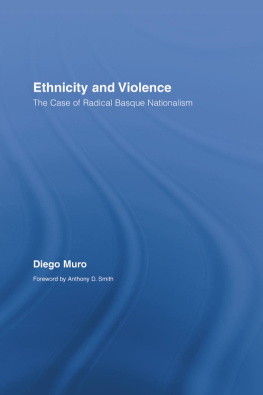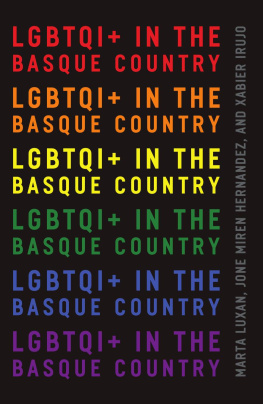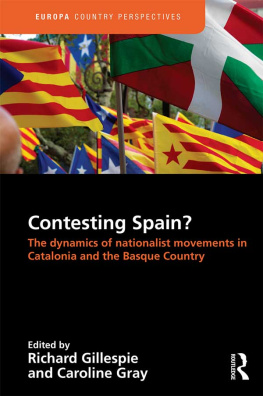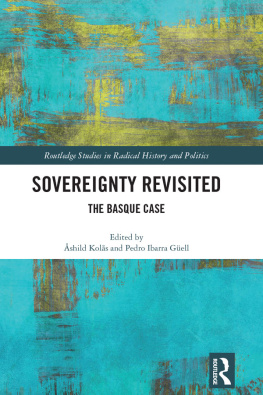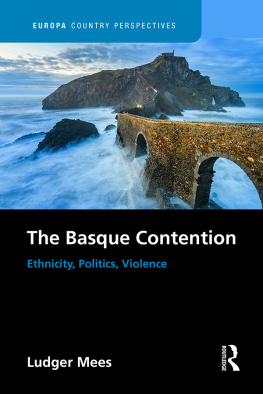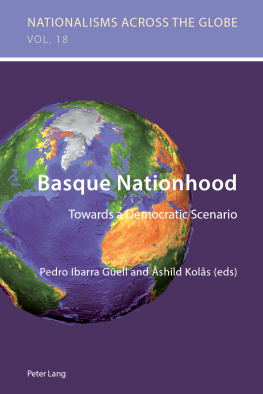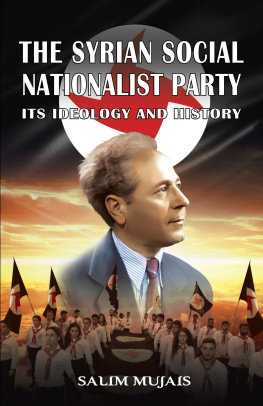Roland Vazquez - Politics, Culture, and Sociability in the Basque Nationalist Party
Here you can read online Roland Vazquez - Politics, Culture, and Sociability in the Basque Nationalist Party full text of the book (entire story) in english for free. Download pdf and epub, get meaning, cover and reviews about this ebook. year: 2010, publisher: University of Nevada Press, genre: Politics. Description of the work, (preface) as well as reviews are available. Best literature library LitArk.com created for fans of good reading and offers a wide selection of genres:
Romance novel
Science fiction
Adventure
Detective
Science
History
Home and family
Prose
Art
Politics
Computer
Non-fiction
Religion
Business
Children
Humor
Choose a favorite category and find really read worthwhile books. Enjoy immersion in the world of imagination, feel the emotions of the characters or learn something new for yourself, make an fascinating discovery.

- Book:Politics, Culture, and Sociability in the Basque Nationalist Party
- Author:
- Publisher:University of Nevada Press
- Genre:
- Year:2010
- Rating:5 / 5
- Favourites:Add to favourites
- Your mark:
- 100
- 1
- 2
- 3
- 4
- 5
Politics, Culture, and Sociability in the Basque Nationalist Party: summary, description and annotation
We offer to read an annotation, description, summary or preface (depends on what the author of the book "Politics, Culture, and Sociability in the Basque Nationalist Party" wrote himself). If you haven't found the necessary information about the book — write in the comments, we will try to find it.
Roland Vazquez: author's other books
Who wrote Politics, Culture, and Sociability in the Basque Nationalist Party? Find out the surname, the name of the author of the book and a list of all author's works by series.
Politics, Culture, and Sociability in the Basque Nationalist Party — read online for free the complete book (whole text) full work
Below is the text of the book, divided by pages. System saving the place of the last page read, allows you to conveniently read the book "Politics, Culture, and Sociability in the Basque Nationalist Party" online for free, without having to search again every time where you left off. Put a bookmark, and you can go to the page where you finished reading at any time.
Font size:
Interval:
Bookmark:

This book was funded in part by a grant from the Program for Cultural Cooperation Between Spains Ministry of Culture and United States Universities. University of Nevada Press, Reno, Nevada 89557 USA
Copyright 2010 by University of Nevada Press
All rights reserved
Manufactured in the United States of America
Library of Congress Cataloging-in-Publication Data
Vazquez, Roland, 1964
Politics, culture, and sociability in the Basque nationalist party / Roland Vazquez.
p. cm. (The Basque series)
Includes bibliographical references and index.
ISBN 978-0-87417-822-7 (hardcover : alk. paper)
1. Euzko-Alderdi Jeltzalea. 2. NationalismSpainPas Vasco. 3. Political partiesSpainPas Vasco. 4. Pas Vasco (Spain)Politics and government. I. Title.
JN8399.B373N328 2010
324.246'08309466dc22
Font size:
Interval:
Bookmark:
Similar books «Politics, Culture, and Sociability in the Basque Nationalist Party»
Look at similar books to Politics, Culture, and Sociability in the Basque Nationalist Party. We have selected literature similar in name and meaning in the hope of providing readers with more options to find new, interesting, not yet read works.
Discussion, reviews of the book Politics, Culture, and Sociability in the Basque Nationalist Party and just readers' own opinions. Leave your comments, write what you think about the work, its meaning or the main characters. Specify what exactly you liked and what you didn't like, and why you think so.


